Comparing Online Submission Managers
I’ve been publishing and submitting poetry (and short fiction) for over a decade and I’ve come across several online managers during this time (RIP Tell it Slant), so I thought it might be fun to review ones that I’ve used and my thoughts.
First up to bat is the classic monolith, Duotrope. Here you can find a long list of magazines, anthologies, or presses due to Duotrope’s length of time online (since 2005). When you see a publication listed on Duotrope, there is a sense of respect and pride that comes with that. Duotrope states they have 7,500 publications listed and also heralds that “Unlike other resources, we don’t wait for information to come to us. Instead, we check each active listing’s guidelines page for changes once a month on average.”
How does it handle? Last year, I tried out Duotrope for a free trial. Why? Because I was very interested in the all the data you can gather such as acceptance rates, the average length of time I will hear back from a publication, and I like how you can see so much in one glance.
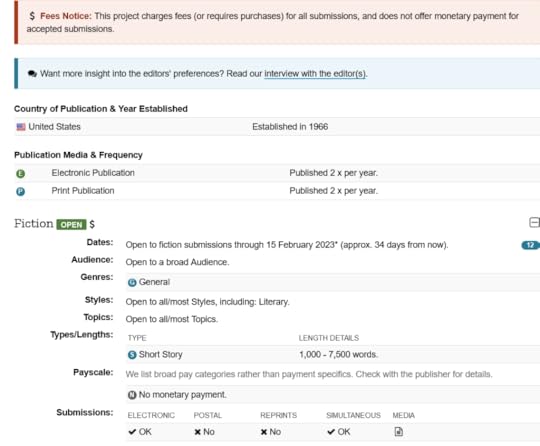
I also appreciate that Duotrope takes note (in the top red box) of publications that charge fees but don’t pay writers. I like the features for submitting to agents but did not utilize this. The upcoming deadline calendar is a nice touch and could help you find something new, if you got something ready!
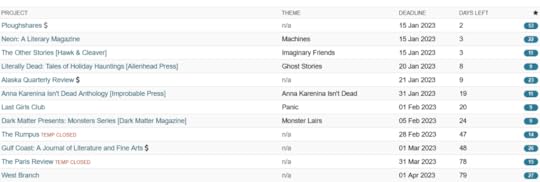
Overall, though, I was not a fan of finding new or unfamiliar publications to submit to. I like data, don’t get me wrong, but I was overwhelmed with how selective you can get. It was visually a lot to process. You can see how detailed you can get below:
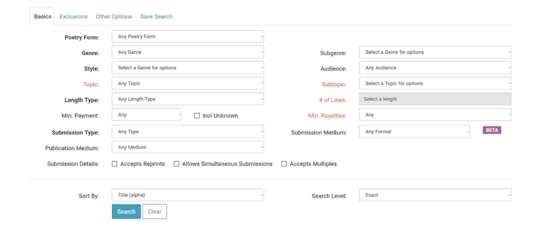
The cost for Duotrope is $5 a month ($50 for a year) which isn’t awful by any means. I personally didn’t like it so ended up stopping after my free trial was over. If you like data and detail, you’ll probably like it.
Next up, we have Submittable! I use Submittable frequently since a massive amount of publications I submit to require you to submit via this manager. It is free for users but this cost moves towards the publication with publications sometimes saying things like “Submissions open until Feb 15 or until we hit our free monthly limit.” That can sometimes mean that you miss out if you aren’t fast enough.
I mostly have used it to find more open calls using the Discover tab. It’s a quick and easier visually but I do have to click to find out more information, though.
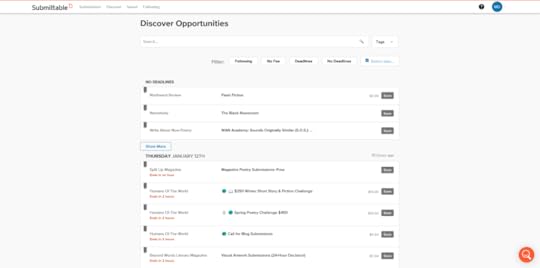
Although more visually appealing than Duotrope, I do frequently find inaccuracies. So many times I will click “no fees” for submissions only, after clicking the call and reading paragraphs of information, do I see the submission fee. The Discover tab has frequent tags such as “haiku” or “flash fiction” but they are limited (also, someone tell me why “tequila” is an option? This apparently is an untapped topic for future writing). I do like that you can save a submission for later.
The submitter itself leaves much to be desired. Often times I will have to click and dig around to remember the details of the call. Was this paid? Can I query? Sometimes the original call has also disappeared altogether so I’m left wondering what is going on?

Also, sometimes the list of rejections sucks to look at but that might be true of all trackers and on me.

Next up, we have The Submission Grinder (now just called The Grinder). It’s a no frills manager that helps you track what you submitted and how long it’s been out. You can also see public data on who is hearing back from who. You can literally see when magazines are sending out mass rejections (and take solace) or even toot about your own acceptance success.
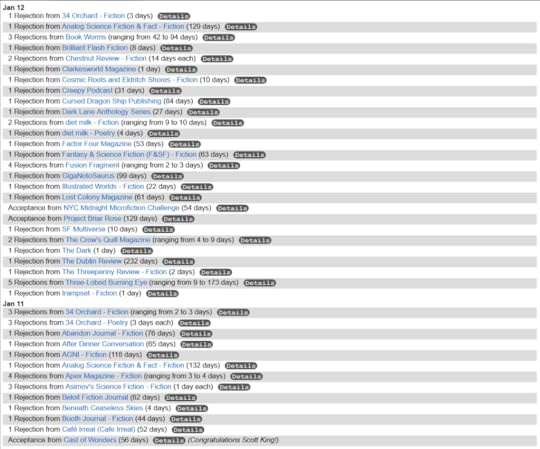
I used The Grinder for a bit but, again, it struggles with helping me discover new publications. You can get detailed (not as much as Duotrope, but it is free) when trying to find a good submission for a piece.

I think I had a harder time using this one because it data is populated by users and it appears that most users are writing and submitting fiction (particularly genre fiction). It was hard to find poetry data and sometimes I would be the only and first poet to submit something like length of time to hear back.
Last up, is one that is newer to me and I’m just trying out, Chill Subs. I discovered this one when they sponsored a contest I submitted to. This is also a free manager which allows writers to create an author page (helpful for promoting books or other content). It does have the detailed submission finder:

Which I’m coming to accept that I just don’t like to use. But, luckily, they have a visual way to scroll through magazines as well.
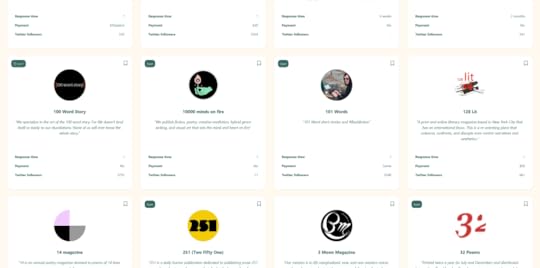
You can quickly find out if they have open calls, how long you’ll wait, and if they pay (and that’s really the majority of the information I need). Like Duotrope, they also have a calendar for upcoming deadlines (which I think looks much better).
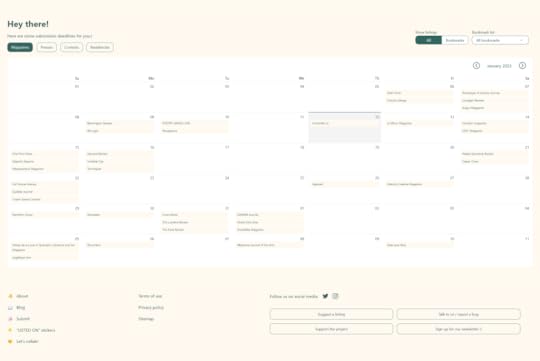
You can also play “rejection bingo” and earn “badges” on your profile for things such as finding website bugs or getting a high number of acceptances. Since they are newer, they have 1,000 verified publications (quiet a bit fewer than Duotrope).
So, there you have it! Let me summarize some quick takeaways.
Duotrope is for you if you like TONS of data about TONS of publications. You’re okay with paying and need specifics to help you find certain publications or even agents.Submittable is for you if you like using the same SIMPLIFIED website you use to submit to publications themselves. The Grinder is for you if you like NO FRILLS, especially if you like live data and if you write genre fiction.Chill Subs is for you if you like VISUAL features to find publications and enjoy some gamified features like badges.At the end of the day, pick which submission manager is going to work best for you! To this day, I still use an Excel spreadsheet to give me a very quick track of what is pending publication where but it’s always great to explore what other features are coming out on submission manager websites.
Did I miss any in my list? Any you would recommend or any personal experience you would add? Let me know below!



